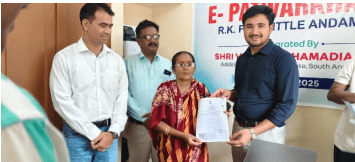A review of developmental activities, resolution of land revenue cases, and promotion of a rooftop solar scheme marked the recent visit of the Additional District Magistrate/Sub-Divisional Magistrate of South Andaman to Little Andaman. The visit, held on 6 August 2025, combined administrative oversight with public outreach and awareness efforts.
The ADM, accompanied by senior police officers and elected representatives, convened a meeting at the Panchayat Samiti Bhawan in Hut Bay with heads of various departments and local Panchayati Raj Institution (PRI) members. The meeting centred on assessing the progress of ongoing projects and discussing issues raised by officials and elected leaders. According to officials, concerns were addressed on merit, with assurances given to expedite pending works.
A key feature of the visit was the organisation of a camp court, where cases related to land revenue matters, including mutations and diversions, were heard and disposed of in the presence of applicants. The initiative aimed to bring dispute resolution closer to residents, reducing the need for travel to administrative hubs.
The public was also briefed on the PM Surya Ghar: Muft Bijli Yojana, a government scheme offering free electricity to households through rooftop solar installations with subsidised support. The scheme is positioned as both a cost-saving measure for families and a step towards clean energy adoption in the islands.
In addition to the administrative and legal proceedings, the visiting team toured the PM SHRI Government Senior Secondary School at R.K. Pur. Interactions with the principal, staff, and students were followed by a review of the academic environment and an inspection of the Mid-Day Meal cooking area. The ADM expressed appreciation for the school’s efforts in promoting holistic and inclusive education, while noting the importance of maintaining standards in nutrition and facility management.
The visit reflects a multi-pronged approach to governance in remote island communities, combining project monitoring, public service delivery, and targeted awareness drives. By holding a camp court alongside the development review, authorities were able to address both administrative backlogs and immediate public needs in a single engagement.
Officials highlighted that such visits allow the administration to better understand local challenges, especially in geographically isolated regions where logistical constraints can slow service delivery. Direct interaction with PRIs and community members provides feedback that can be factored into planning and prioritisation.
The emphasis on the rooftop solar scheme during the visit aligns with the Union Territory’s broader sustainability goals. Encouraging household-level renewable energy adoption not only reduces dependency on conventional power sources but also contributes to long-term energy security for the islands.
The combination of administrative review, on-the-spot case resolution, and public awareness outreach during the Little Andaman visit is seen as an example of integrated governance. Authorities are expected to continue similar engagements in other parts of the district to ensure that development goals remain aligned with community needs and that public services are accessible to all residents.





